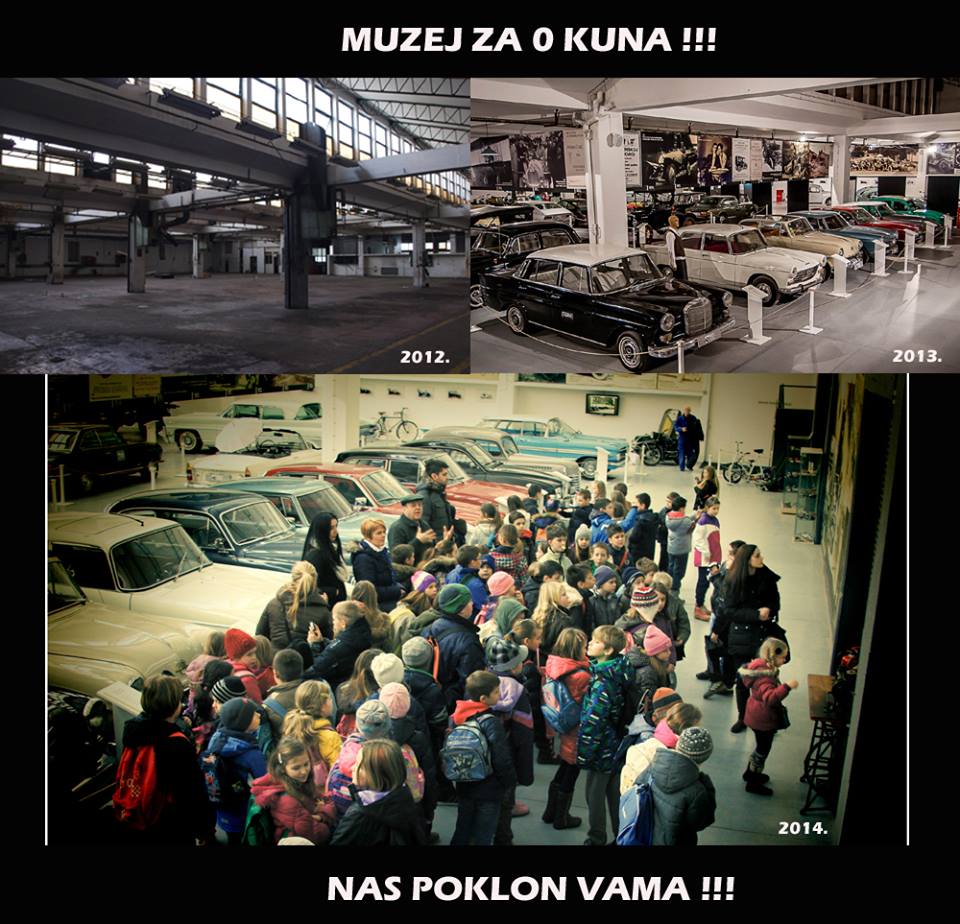The sad story of the popular Zagreb museum of cars, the first of its kind in the country, which will have to leave its premises to due to unpaid debt.
Due to the nearly half-a-million kuna debt and the financial blockade, Ferdinand Budicki Automobile Museum might get closed down and thrown out of the city-owned property in Zavrtnica by the end of this year, reports Jutarnji.hr on October 23, 2017.
The museum is engaged in litigation against the City due to debts. The museum manager Valentino Valjak notes that they simply cannot pay the city fees despite the high museum attendance. With around 13, 000 children visiting the museum annually, approximately 350 thousand kunas are earned from the ticket sales, which is still not enough to cover all costs.
"It's a space of 1500 squares metres. Each month, the Zagreb Holding charges were higher than HRK 20,000, which is why we ended up with a debt of 180,000 kunas at the end of each year. We just couldn't cope with such high costs burdening us," says Valjak.

Court case epilogue
The story of the decline began, in fact, in May 2014, just one year after the museum opened, when the City established debts due to the unpaid lease and the use of space. Valentino Valjak, the museum's manager, said they made a deal with the City that they did not have to pay for municipal fees because they invested almost one million kunas in the reconstruction of space. The City representatives, on the other hand, claim that the agreement was temporary, valid only at the time of the reconstruction works.
"All of the reconstruction works at the abandoned and devastated factory hall, as well as the visual identity of the museum, were realised without the financial assistance of neither the city nor the state institutions, but exclusively through private donations and free voluntary work by members of the association," says Valjak. Three years ago, the city terminated the contract with them and asked them to leave the property. Execution and bankruptcy soon followed, and the final outcome of the case will be known in several months when the court proceeds end.
Nonetheless, groups of pupils and children and many tourists are coming to the museum on a daily basis, as the museum continues to be featured in the city's travel guides. Annual ticket revenues of the museum are around 350,000 kunas, which is enough to cover the overhead expenses, but not to function normally. They cannot pay the workers, and the debt has become too big for them to handle.
"It seems that this space is the target of some city officials. This is the only way that they can get rid of us. In the case of eviction, Europe will have an opportunity to see how it looks when a museum is emptied out," he says.

Fighting their battles
Although Ferdinand Budicki Automobile Museum has been experiencing major business losses, some other private museums in Zagreb have no debt problems. For example, Backo Mini Express, the largest railroad museum in this part of Europe, pays around 15,000 kunas each month on overheads, which includes the rent paid to the City for one part of the space, and their only income is generated from the ticket sales. The Museum of Illusions is in a similar situation. On average, they pay utility charges in the amount 5000 kunas for their 220 square meters along with the rent of the privately-owned space. Roko Živković and Tomislav Pamuković got a loan and invested in the space in Ilica 72 all by themselves. The museum opened two years ago, and today it has 20 employees with more museums in Zadar, Ljubljana and Vienna.
They receive money from the City only for special projects, while the Tourist Board Zagreb grants them funds on an annual basis. However, Živković points out that these are the minimal amounts of money. The Museum of Broken Relationships annually spends 10 thousand kunas for overhead expenses, and none of the city or state institutions provides them with regular grants. The museum signs up for various competitions and tenders, but the director of the museum, Marija Curić says that this money makes up between 2 and 3 percent of their annual income.
Translated from Jutarnji.hr
Photos: Muzej automobila Ferdinand Budicki Facebook


